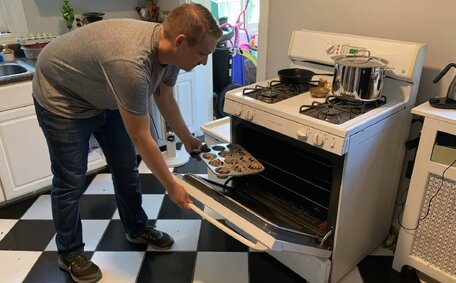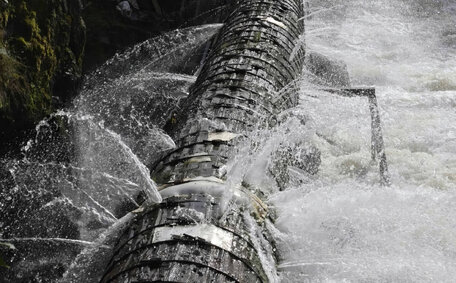Introduction: Kitchen vs Bathroom Sinks - What’s the Difference?
Your kitchen sink and bathroom sinks serve distinct purposes in your home. The kitchen sink handles food preparation and cleanup, disposing of grease, oils, and food waste on a regular basis. Bathroom sinks deal more with personal grooming tasks, often involving washing your hands and faces, meaning more hair and soap scum goes down them.
These most common uses lead to unique types of blockages.
Bathrooms see more issues from hair and soap that slowly build up, resulting in a slow draining sink.
Understanding the differences in unclogging methods for kitchen sinks aids prevention and resolution of clogs. Specific steps, like learning how to unclog kitchen sink and bathroom sink issues should be taken to get them working properly again.
Common Causes of Clogs in Kitchen Sinks
Several reasons why your kitchen sink gets blocked include:
- Pouring fats, oils, and grease (FOG) down the drain contributes to blockages as they cool and harden.
- Disposing of food scraps and solids which get stuck
- Allowing large food particles and produce pulp to contribute to a sink clog as they go down the drain
- Use cold water liberally during food cleanup to assist the flow in your sink.
Food scraps adhering to solidified oils create blockages in kitchen drains, disrupting the water flow.
Not removing bulky food waste like vegetable peels causes backups, as these items snag inside drains.
Sink blockages often result from garbage disposal misuse, such as overloading and insufficient water flow during operation.
Grease and Fat Buildup
As oils and fats from food preparation go down plughole, they cool and harden into solids that cling to pipe walls. These deposits can lead to a fully blocked kitchen sink drain, obstructing water flow.
Prevent grease clogs by adopting better waste management practices in the kitchen:
- Reduce sink blockage risk from oils by wiping cookware with paper towels to remove excess residues before rinsing.
- Consider using strainers in the kitchen sink when washing greasy dishes to catch food particles. Empty the strainer into the trash when done.
Ignoring these tips can lead to a sink clogged with grease, whereas proper disposal habits prevent such blockages.
Food Scraps and Debris
Food scraps like vegetable peels, eggshells, coffee grounds, and leftover table scraps also frequently contribute to kitchen sink clogs. These items can easily get lodged in pipes and drains as debris builds up behind them.
The best way to prevent food scrap issues includes:
- Scrape or wipe plates and cookware to remove leftover food into your rubbish or compost bins before rinsing.
- Use sink strainers and empty any collected particles into the compost or trash frequently.
- Avoid putting any large food items down the drain such as corn husks or cobs, lettuce cores or big fruit peels.
Take care to adhere to these disposal tips for food debris diminishes the chance solids will end up stuck in your pipes, causing nasty backups. Take preventative steps to keep food waste from ending up deep in your plumbing where it can jam drains.
Common Causes of Clogs in Bathroom Sinks
Bathroom sinks often clog due to hair, soap residue, and personal care products accumulating in the drain. The smaller diameter pipes found in most bathroom sink plumbing can get your sink to accelerate buildup.
Common causes include:
- Hair from grooming accumulates in pipes, potentially damaging plumbing and causing bathroom sink clogs
- Soap scum from handwashing mixing with hair
- Toothpaste, cosmetics, and other gunk washing down the sink
Narrower bathroom sink pipes quickly collect debris, posing a risk to your plumbing system. Without regular cleaning, debris in sinks hardens and leads to clogs.
Hair Buildup
Excess hair going into the drain is a major contributor to bathroom sink clog issues. Hair from daily grooming practices accumulates in pipes, leading to clogs.
- Use hair catchers or drain screens, and make sure to regularly clear out your sink drains to trap strands.
- Collect hair removed while grooming and dispose in the rubbish bin.
- Use a drain snake monthly to remove hair or consider enzyme cleaner products specifically designed to dissolve hair buildup.
Capturing and removing hair safeguards against pipe clogs and ensures water flows freely.
Soap Scum
Soap scum buildup is another key contributor to bathroom sink clogs. As soap and shampoo residue wash down drains, they leave behind a filmy, sticky substance. This scum accumulates on pipe walls and binds with hair strands and other debris passing through.
Taking proactive steps to keep soap scum from settling into your sink:
- Use liquid hand soap instead of bar soap to reduce residue.
- Install a sink strainer and clear out hair and gunk buildup weekly.
- After use, drying drains and pouring white vinegar with hot water prevents scum buildup.
- Pour some hot water down the drain weekly, or apply a baking soda vinegar solution to dissolve soap buildup.
- Monthly plunging dislodges scum accumulation, maintaining clear drains.
Staying vigilant with soap scum control prevents a clogged sink and keeps bathroom sink drains free-flowing. Be diligent about cleaning routines before major obstructions form.
Clearing Blockages: Kitchen vs Bathroom Sinks
Different blockage causes in kitchen and bathroom sinks necessitate unique unclogging approaches.
Clearing Kitchen Sink Clogs
Unclogging a kitchen sink often involves using a plunger to remove grease, fat, and food debris. Position the plunger over the drain stopper and plunge up down rapidly 10-15 times to loosen the clog.
Specialised chemical drain cleaners designed to dissolve grease can clear kitchen sink obstructions. Strictly follow product instructions, wearing rubber gloves and avoiding mixing different chemical products.
For severe sink clogged kitchen sinks, placing a bucket under the P-trap and using a drain auger or snake is essential to physically remove the grease and food accumulation. Slowly turn the hooked end to catch debris and break up clogs as you extract them from pipes.
Clearing Bathroom Sink Clogs
Plungers effectively remove blockages, such as those caused by hair and soap scum, in kitchen and bathroom sinks. Combine plunging with the method to pour hot water down the drain to help melt and flush away buildup.
Natural drain cleaners or modified coat hangers can effectively remove sink blockages. This hooked device latches onto hair accumulations and pulls out clumps clearing drains as you extract them.
Liquid drain cleaner products formulated for soap scum and hair can break down blockages when used as directed. Apply safety precautions wearing gloves and avoiding mixing products.
For extremely blocked bathroom sink drains, youll need a professional to snake the drain pipe to remove stubborn hair and soap masses.
Preventing Future Blockages
Preventing future clogs in kitchen and bathroom sinks requires developing good daily habits and regularly performing maintenance.
Kitchen Sinks
- Avoid pouring fats, oils, or grease down the drain; instead, let them cool and discard in the bin.
- You can use sink strainers and empty food debris into compost or rubbish bins frequently.
- Run plenty of cool water when using the garbage disposal to ensure your entire plumbing system, including plumbing vents and waste lines, flushes smoothly.
- Consider connecting a grease trap to your washing machine and sink to capture oil, grease, and fat before they enter pipes.
- Use enzyme drain cleaner monthly to actively break down grease in pipes.
Bathroom Sinks
- Employ hair catchers and clean them weekly to avoid buildup.
- Pour a kettle of hot water weekly to melt soap scum.
- Use a sink plunger monthly to dislodge accumulated hair and gunk.
- Use a baking soda and white vinegar mixture monthly to dissolve soap scum.
- Snake or remove sink blockages from bathroom drain pipes every 4-6 months preventatively.
Regular maintenance steps can prevent expensive plumbing services for sink blockages.
When to Call a Professional Plumber
While DIY methods can resolve simple clogs, complex blockages require a professional plumber like those at Erskine Park.
Contact us right away if you experience:
- A completely blocked kitchen or bathroom sink that won’t drain
- A sink still overflowing with standing water that won’t go down
- A strong sewer gas smell coming from drains
- Multiple plumbing fixtures backing up with water and emitting gurgling sounds
- A draining sink that persists in being slow despite trying sink plungers and drain cleaners
- Kitchen garbage disposal jamming frequently
- Previous DIY attempts to clear the clog have failed
Our licensed technicians diagnose and resolve tough blockages, such as those caused by tree roots, using specialised equipment.
Our inventory includes commercial drain cleaning machines designed to tackle even the most stubborn clogs from grease, fat, food waste, and hair.
For persistent kitchen or bathroom sink blockages, enlist your local professional plumbers to resolve and prevent drainage issues.
Contact Erskine Park Plumbing today by phone on 1300 349 338 or email [email protected] for reliable sink blockage solutions.






